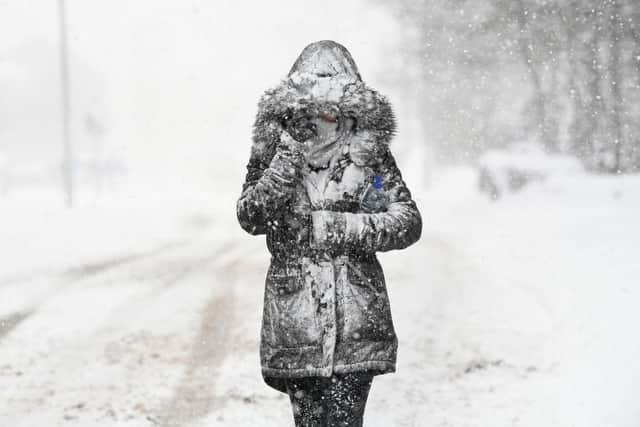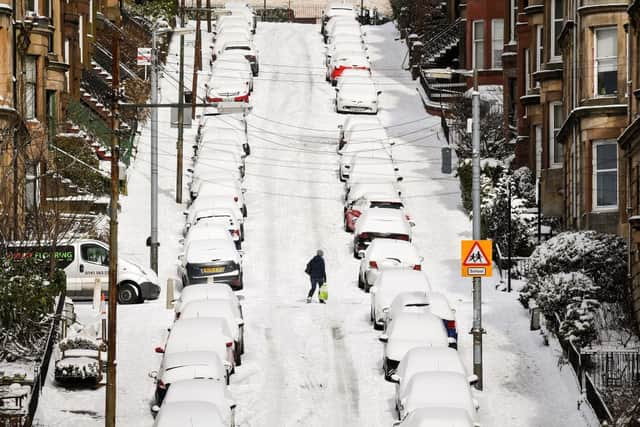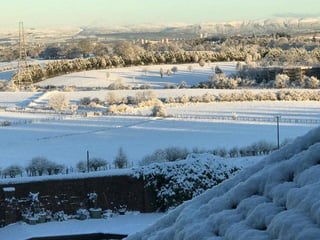Beast from the East: are we getting another one in 2021 – and when did the 2018 Harmut cold spell hit Scotland??
Police have warned people not to travel as heavy snow and ice brought disruption to parts of the UK, closing coronavirus vaccination centres and schools.
Parts of Scotland reached as low as nearly minus 18 Celsius on Monday night as the country faced Storm Darcy, with areas including Edinburgh and Glasgow facing a loss of electricity supplies amid the wintry weather.
Advertisement
Hide AdAdvertisement
Hide AdThe Met Office has extended its forecast for snow and icy conditions towards the end of this week, as as extreme weather is expected to cause disruption to transport and power, with a band of cold air forecast to move in from the east, remaining in place for the early part of next week.


The cold air driving the weather conditions emanates from Russia and Eastern Europe, with many ahead of the cold snap predicting conditions that could have mirrored those of 2012’s ‘Beast from the East’.
Here is everything you need to know about it.
What was the Beast from the East?


‘Beast from the East’ was the name given by the media to a 2018 anticyclone that began on 22 February and brought a cold wave to Great Britain and Ireland.
As a result of the storm – which transported only cold air from Siberia to Europe – the country experienced heavy snowfall in large areas and unusually low temperatures, the lowest recorded being minus seven on the Scottish mountain of Cairn Gorm.
The weather event was particularly extreme because it combined with Storm Emma, and sixteen weather related deaths were recorded as a result, including that of a seven-year-old girl in Cornwall who was killed when she was hit by a car that slid on ice into a bungalow.
Is this another Beast from the East?
It's not the first time the possibility of a ‘Beast from the East 2’ has been touted this year.
In January, forecasts for heavy snow and freezing conditions across Scotland and northern England saw a rise in the use of the phrase, but the resultant weather was unlike anything seen in 2018.
This recent spate of extreme weather – while cold and bringing treacherous conditions that will require vigilance – is still not quite as severe as that seen three years ago.
Advertisement
Hide AdAdvertisement
Hide AdResponding to claims that the conditions could return, BBC meteorologist Matt Taylor said: “We’re not expecting temperatures to be as cold as those experienced during such an event in 2018, nor will snowfall be quite as widespread.
Where are the UK weather warnings?
The Met Office has issued severe amber snow warnings for London and south-east England, where heavy snow is likely to cause long delays on roads as well as affecting rail and air travel.
Another amber warning is in place for Nottinghamshire and north to Sheffield, as well as east into Lincolnshire. Both warnings said power cuts are likely, along with interruptions to mobile phone services.
On Monday, police forces in parts of Suffolk, Norfolk and Essex told drivers not to travel as roads became “impassable” due to settled snow.
Road closures were announced in Norfolk, Lincolnshire, Cumbria, Derbyshire and Hertfordshire – in Norfolk, one driver had to be dug out of his car after it got trapped in a snowdrift.
In Scotland, the Met Office forecasts that snow showers will continue during the day on Tuesday and into the evening; an amber warning is in place until 9pm.
Will the weather affect coronavirus vaccinations?
First Minister Nicola Sturgeon has voiced concern about the potential impact severe weather could have on the Covid-19 vaccination programme.
Nicola Sturgeon said forecasts of snow “make my heart sink”, but she added measures are in place to minimise the impact on the rollout of the jab.
Advertisement
Hide AdAdvertisement
Hide AdSpeaking at the daily coronavirus briefing last week (4 February), Sturgeon said she is “always concerned” when there is severe weather forecast but “obviously we want people to be able to get to vaccination centres.”
She added: “There’s lots of work going into making sure there is gritting and snow clearing where necessary so we keep the vaccination programme running as smoothly as possible, even when there is bad weather.”
Anyone concerned about going for their vaccination in severe weather should contact their local health board, who will either be able to give advice on how to get to the appointment or reschedule it.
Dr Owen Landeg, group leader of extreme events and health protection at Public Health England, said it was “crucial” that people check in with relatives and neighbours.
“Make a call or socially-distanced doorstep visit if they live close by, to remind them of some simple but important health tips. It’s also helpful to check they have enough food and drinks and any medicines they need.”

